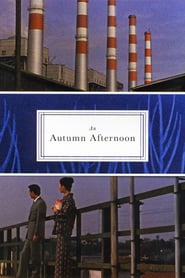
I find it so very true that human beings are like snowflakes, in that each one of us is so very different from each other. The great Japanese director, Yasujiro Ozu understood this very well, and I believe this is why throughout most of his career he made films that dealt with very similar and ordinary domestic situations. His themes were very consistent, for which he kept going back to again and again. Middle aged ordinary people who have to make selfless decisions during a life that while surrounded by historical events seemed insignificant to the big picture. Yet each of his films featured characters who were uniquely original. Relationships between adult parent and their adult children were a prominent part of his interest and the center of his last film, being 1962’s, “An Autumn Afternoon”. The movie concerns the life of a late middle aged office worker Shuhei (Chishu Ryu, who was a regular of Ozu’s), who is a widower with three grown children. The eldest son is married and the younger son is just 21, still living at home. His middle child is his beloved daughter. Michiko. She is 24 years old, and has taken the place of her dead mother in running the household. She takes excellent care of Shuhei and her brother. For his part, Shuhei likes to eat and drink with two of his good friends, almost every night after work. He is comfortable knowing that Michiko is there to take care of the house, allowing him to drown out the loneliness he has through alcohol and male companionship. During one such night during what was his high school reunion, he escorts his old teacher back home, when that teacher is too drunk to get home on his own and meets the teacher’s middle aged single daughter who stayed single in order to take care of the teacher, probably after her mother had died. This revelation comes at a time when his friends are telling him that he must find a marriage match for Michiko. The movie then centers on the decision that Shuhei makes for his daughter’s future. It should be remembered that Japanese society of the early 60’s, had tradition and obligations that gave power to men over their daughters. Ozu fills this simple premise with great depth and I was swept into the lives of these ordinary people. Each character shown has an essential and important role to play in the story. Of his two main friends, one has married a much younger wife and the other I felt lived a comfortable conformist life, while taking on the part of mentor and advisor. It is he who tells Shuhei that he must think about his daughter and find a suitable match so that she can marry. Shuhei who never remarried knows that by marrying his daughter, he will doom himself to loneliness. Is his love for Michiko greater than his own personnel interest? That is the essential drama of the story. Ozu however gives us much more depth and detail to this main theme. There is a bar that Shuhei likes to go to alone because the bartender is a young happy woman who reminds him of his dead wife. In another scene we find out that he was an officer in the Japanese Army and the national pathos of losing a war is emphasized and adds to the depth of knowledge to the characters in the movie. Ozu had very distinct film techniques that he used in almost all his movies. Scenes are filled with singular unmoving shots taken from a still position and low to a height of someone who is sitting on the floor. Characters look straight at the camera when they speak and these techniques serve to bring the audience closer to the characters. In any case, I felt that I was privy to their private world. A lot of what is relayed is done through physical rather than vocal language as the main characters of Shuhei and Michiko do not say a lot to each other but yet I was still aware of the great love that existed between them. Ozu died a year after this movie came out making it his swan song of a great career and like a poignant poem; it is a fitting and delicate piece of celluloid humanity from a master filmmaker.

